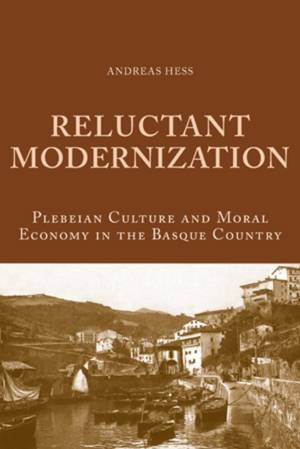
Door een staking bij bpost kan je online bestelling op dit moment iets langer onderweg zijn dan voorzien. Dringend iets nodig? Onze winkels ontvangen jou met open armen!
- Afhalen na 1 uur in een winkel met voorraad
- Gratis thuislevering in België vanaf € 30
- Ruim aanbod met 7 miljoen producten
Door een staking bij bpost kan je online bestelling op dit moment iets langer onderweg zijn dan voorzien. Dringend iets nodig? Onze winkels ontvangen jou met open armen!
- Afhalen na 1 uur in een winkel met voorraad
- Gratis thuislevering in België vanaf € 30
- Ruim aanbod met 7 miljoen producten
Zoeken
Reluctant Modernization
Plebeian Culture and Moral Economy in the Basque Country
Andreas Hess
Paperback | Engels
€ 63,95
+ 127 punten
Omschrijving
Three institutions that are of particular importance to Basque history and culture form the main subject of this book: the baserria (the Basque farmstead), the cofradía (the fraternity of fishermen) and the txoko (gastronomic society). In this study the three institutions are seen as windows; once we look through these windows, we get an opportunity to see the larger picture - namely the structural components of a rich plebeian culture and moral economy. While the investigation of baserri culture provides insights into Basque rural life and the radical changes that occurred with industrialization, the cofradía allows the reader to see the connection that the Basque Country has with the sea. The third institution, the txoko or sociedad gastronómica, represents a more recent and urban phenomenon and reflects an effort to come to terms with urbanization and the anonymous forms of modern life. The book closes with some reflections on cultures that have been somewhat reluctant to modernize.
Specificaties
Betrokkenen
- Auteur(s):
- Uitgeverij:
Inhoud
- Aantal bladzijden:
- 199
- Taal:
- Engels
Eigenschappen
- Productcode (EAN):
- 9783039119080
- Verschijningsdatum:
- 10/06/2009
- Uitvoering:
- Paperback
- Formaat:
- Trade paperback (VS)
- Afmetingen:
- 150 mm x 220 mm
- Gewicht:
- 299 g

Alleen bij Standaard Boekhandel
+ 127 punten op je klantenkaart van Standaard Boekhandel
Beoordelingen
We publiceren alleen reviews die voldoen aan de voorwaarden voor reviews. Bekijk onze voorwaarden voor reviews.











